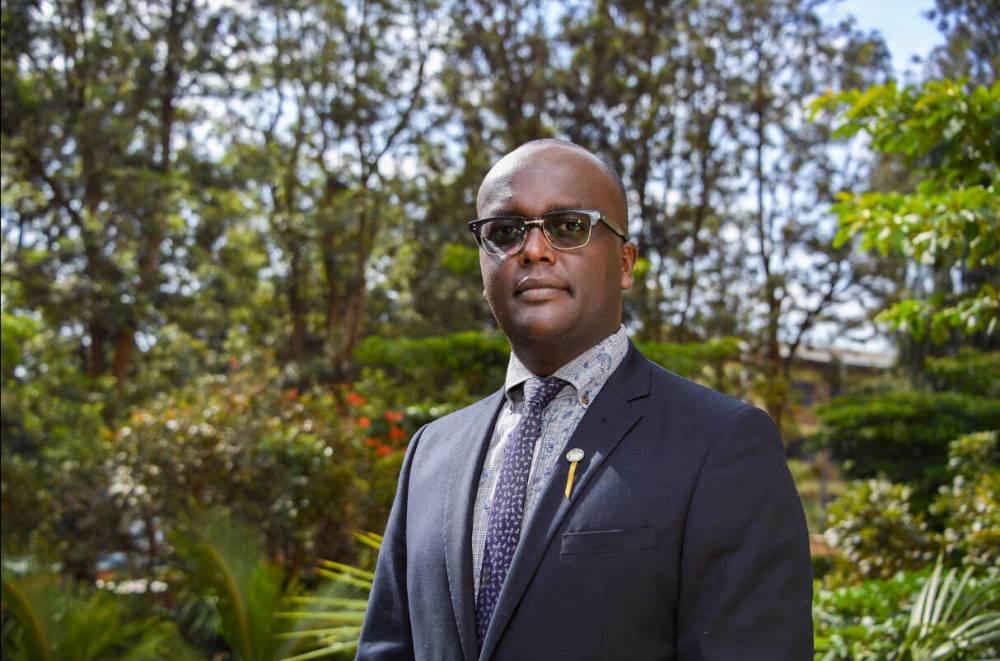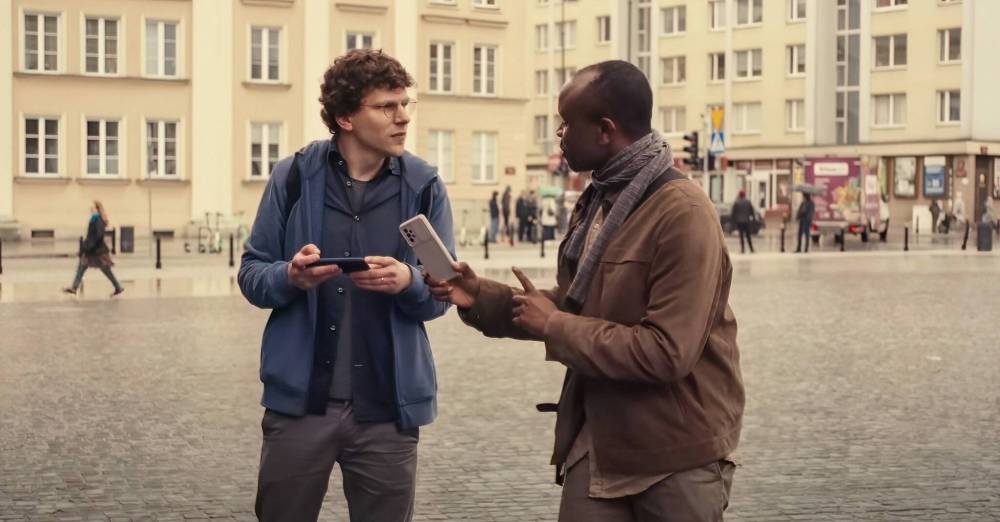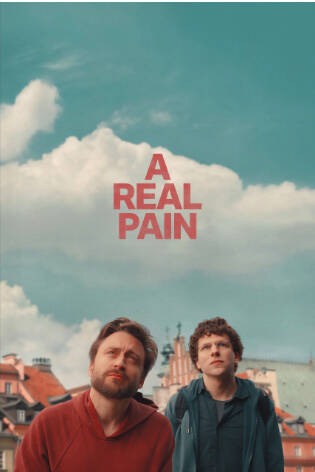Movie trip to Poland included spiritual stop in Winnipeg
Advertisement
Read this article for free:
or
Already have an account? Log in here »
To continue reading, please subscribe:
Monthly Digital Subscription
$0 for the first 4 weeks*
- Enjoy unlimited reading on winnipegfreepress.com
- Read the E-Edition, our digital replica newspaper
- Access News Break, our award-winning app
- Play interactive puzzles
*No charge for 4 weeks then price increases to the regular rate of $19.95 plus GST every four weeks. Offer available to new and qualified returning subscribers only. Cancel any time.
Monthly Digital Subscription
$4.99/week*
- Enjoy unlimited reading on winnipegfreepress.com
- Read the E-Edition, our digital replica newspaper
- Access News Break, our award-winning app
- Play interactive puzzles
*Billed as $19.95 plus GST every four weeks. Cancel any time.
To continue reading, please subscribe:
Add Free Press access to your Brandon Sun subscription for only an additional
$1 for the first 4 weeks*
*Your next subscription payment will increase by $1.00 and you will be charged $16.99 plus GST for four weeks. After four weeks, your payment will increase to $23.99 plus GST every four weeks.
Read unlimited articles for free today:
or
Already have an account? Log in here »
Hey there, time traveller!
This article was published 28/02/2025 (316 days ago), so information in it may no longer be current.
In the Academy Award-nominated film A Real Pain, two Jewish American cousins (Jesse Eisenberg and Kieran Culkin) embark on a meaningful, profoundly funny and personally necessary tour of Poland, the country where some of the most heinous crimes in human history were perpetrated against their ancestors by the Nazis during the Holocaust.
Tours like these bring together Jewish people and students of faith and humanity from all corners of the world, united in their desire to remember and to recontextualize their own freedoms — of expression, of religion, of speech, of movement, of life — as a matter of immense fortune and interpersonal responsibility to those 11 million people, six million of them Jews, who did not make it out alive.
Early in the film, the spiritually detached David (Eisenberg, who also wrote and directed) and emotionally unpredictable Benji (Culkin) settle into their hotel lobby to meet their fellow rememberers. There’s a retired couple, a lone divorcée, a British tour guide, and of course, as is the law, there is a Winnipeg connection.
But considering this city’s reputation as a postwar haven for the displaced Ashkenazi survivors of the Shoah, the Manitoban cameo might not be the one you expect.
He’s a gentleman named Eloge (played by the British-Cameroonian actor Kurt Egyiawan), who informs his tourmates that after surviving the genocide against the Tutsis in Rwanda, he emigrated to Winnipeg, where the Jewish community’s warm embrace inspired him to convert.
A few weeks after the movie opened, word began to circulate of the local namedrop; it turns out Eloge’s character was crafted by Eisenberg as a tribute to a very real man who shared his story, and his name.
Shortly before the Academy Awards ceremony — at which Culkin is up for best supporting actor — Eloge Butera talked to the Free Press about survival, family, halakha and how his story made it into the final draft of an Oscar-nominated screenplay.
“Have you ever read Night?”
The question came from Rabbi Neal Rose, the spiritual leader and educator who taught Butera’s introduction to religion course when the future lawyer and political adviser was still new to Winnipeg, the University of Manitoba, and the intricacies of Prairie Judaism.
Butera, who moved to Winnipeg in 2002 at 18 years old, admitted that the slim memoir — a landmark work by Holocaust survivor and Nobel Laureate Elie Wiesel — was unfamiliar.
“So on Saturday night I went to the U of W, picked up a copy and read it cover to cover,” recalls Butera, who lived through the genocide in his native Rwanda as a 10-year-old boy, about the same age as the Transylvanian Wiesel was when his family was thrust into catastrophe.
“I couldn’t believe there were words to describe the extreme nightmare where you wake up and the world is coming to destroy you, with no one coming to help. The way it was articulated put language to the pain that I was carrying myself as a 19-year-old in Winnipeg.”
LS Anne-Marie Brisson, Rideau Hall Photo Eloge Butera, Rwandan genocide survivor, converted to Judaism during his time in Winnipeg.
In his new home, Butera befriended Rose and his wife Carol, Shelley Faintuch, the daughter of a Holocaust survivor who worked as the Jewish Federation of Winnipeg’s director of community relations, and the late Holocaust survivor Philip Weiss, who was born in Drohobycz, Poland, in 1922, spending several years as a slave labourer before being liberated from the Mathuausen concentration camp in 1945.
Butera’s reason for coming to Winnipeg was that he had a cousin studying at the University of Manitoba.
He was born in a village in the northeast Mutara region of Rwanda, but Butera’s parents — his father a medical doctor and his mother, who has since become a social worker and NGO founder — moved their three children around periodically for work before the outbreak of war, so relocation was not a foreign concept.
“We lived everywhere. I’m not from one place; I’m from everywhere,” says Butera, who now resides in Montreal but works in Ottawa.
During the 1994 genocide against the Tutsi, Butera’s father, grandfather and much of his extended family were among the estimated 800,000 killed, while Butera, his siblings and his mother survived.
That experience, along with the associated survivor’s guilt, was indescribable and isolating, but Wiesel’s words gave voice to the struggles Butera himself was enduring, much like his friend Jesse Eisenberg’s latest film did.
“I don’t think Jesse would ever say it’s comparable to Night, but to me, A Real Pain opens up a window into the pain we collectively carry in a way that I hope gets a new generation of the world to look at this history honestly and with responsibility, because if you don’t remember it, God forbid, we are condemned to repeat the same mistakes.”
“I couldn’t believe there were words to describe the extreme nightmare where you wake up and the world is coming to destroy you, with no one coming to help. The way it was articulated put language to the pain that I was carrying myself as a 19-year-old in Winnipeg.”–Eloge Butera
Butera’s sense of connection within the local Jewish community inspired him to convert to Judaism, while also becoming a community advocate for human rights education and the University of Manitoba Student Union’s first vice-president of advocacy, a position he held in 2004-2005.
After graduating from U of M, Butera moved to Montreal to study law at McGill, where he articled with former justice minister and attorney general Irwin Cotler, who now serves as the international chair of the Raoul Wallenberg Centre for Human Rights.
Soon after, Butera spent three years as an adviser to Lt.-Gen. Romeo Dallaire.
In 2013, he became an honourary witness to the Truth and Reconciliation Commission alongside Vancouver-area Holocaust survivor Robert Waisman, who became a close friend of Butera’s as they shared their experiences with students across the country.
His brother and mother work together in Rwanda for Tubahumurize, an NGO aimed at helping women who have survived gender-based violence, while his sister, Sandrine, went on to become a leading national broadcaster.
“She used to be the Rwandan Oprah, and now she’s the deputy director general of the Rwanda Broadcasting Agency. She’s the real famous Butera. They haven’t made a movie about her, but they should,” Butera says
Butera met Eisenberg at a Jewish wedding where he and the inquisitive playwright, author and star of films such as The Social Network and The Squid and the Whale struck up an easy friendship.
“It’s a long journey of where our lives, mine and Jesse’s, cross,” says Butera, who shared an abbreviated version of his religious journey with Eisenberg between nibbles.
While developing the script for A Real Pain, the filmmaker frequently spoke with both Butera and his wife about their experiences so he could sensitively portray the Eloge character’s experiences visiting Poland, which Butera did in 2009 on a trip called March of Remembrance.
Searchlight Pictures / Courtesy Everett Collection Director/actor Jesse Eisenberg (left) and Kurt Egyiawan in A Real Pain; Egyiawan’s character is based on former Winnipegger Eloge Butera.
“The trip takes you into the industrial part of the Nazi machinery of death, but also the small villages where the Einzatsgruppen would go and massacre everyone,” says Butera, who’s been an outspoken advocate against the genocide in Darfur.
“The scenes of such a horrific manner were very familiar to me. There is having lived through a genocide, but also the character taking on what we call in Halakha ‘The yolk of the Torah,’ and portraying that in a very artistic way is a craft that Jesse can accomplish which I can’t.”
Butera and his wife attended the film’s glitzy première at the New York Film Festival, where the rapturous reception triggered awards buzz.
Most importantly to Butera, the response stimulated conversation about survival, reconciliation, communal responsibility and the danger of history repeating itself.
“The movie brings the human dimension to a question that needs to be awakened in the minds of many people in our society today, who don’t feel as close as we do to the pain and the weight of the history that was the Holocaust,” says Butera, who says the film depicts “two real guys who embody an authentically Jewish, but also universal, experience.”
“I think the biggest contribution is its ability to open the window for the rest of humanity to come, to tell them that though they cannot bear that pain, that they can at least bear witness to it, and maybe, just maybe, that is enough.”
Butera won’t be attending the Oscar ceremony, as he is currently working with Dallaire on humanitarian campaigns for traumatized veterans in Ukraine, while also serving as a key adviser in Karina Gould’s bid for the federal Liberal leadership.
“I will be watching and rooting for Kieran, who is a wonderful man, a wonderful father, down-to-earth, awesome human being, and of course for Jesse, who put the whole thing together. He’s an amazing director and actor, and I’m very much looking forward to him winning this thing.
“But I don’t think I need to go to California for the awards show,” he says, laughing at the suggestion, which comes during a time of cross-border quibbles.
“I’m not quite ready to visit the 11th province at this time.”
ben.waldman@winnipegfreepress.com

Ben Waldman is a National Newspaper Award-nominated reporter on the Arts & Life desk at the Free Press. Born and raised in Winnipeg, Ben completed three internships with the Free Press while earning his degree at Ryerson University’s (now Toronto Metropolitan University’s) School of Journalism before joining the newsroom full-time in 2019. Read more about Ben.
Every piece of reporting Ben produces is reviewed by an editing team before it is posted online or published in print — part of the Free Press‘s tradition, since 1872, of producing reliable independent journalism. Read more about Free Press’s history and mandate, and learn how our newsroom operates.
Our newsroom depends on a growing audience of readers to power our journalism. If you are not a paid reader, please consider becoming a subscriber.
Our newsroom depends on its audience of readers to power our journalism. Thank you for your support.












